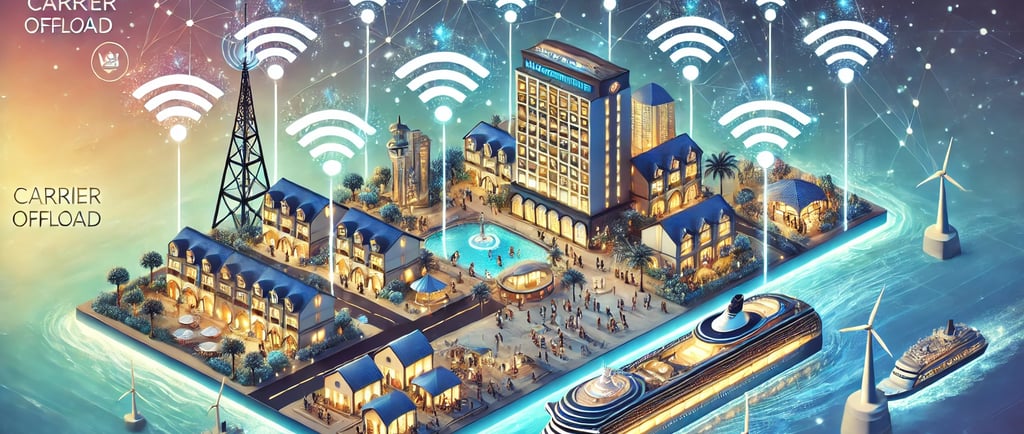Carrier Offload in the Hospitality Industry: Enhancing Guest Connectivity
Discover how carrier offload is transforming guest connectivity in hotels, resorts, and cruise ships. Learn how hospitality businesses provide premium WiFi experiences with innovative offload strategies.
BLOG
WayFi Morgan
1/17/20254 min read


Carrier Offload in the Hospitality Industry: Enhancing Guest Connectivity
In the modern hospitality industry, seamless connectivity is no longer a luxury—it’s a necessity. Whether traveling for business or leisure, guests expect fast, reliable internet access during their stays. For hotels, resorts, and cruise ships, meeting this demand while managing network congestion and costs is a growing challenge.
This is where carrier offload comes into play, enabling hospitality businesses to provide premium connectivity by redirecting mobile data traffic to robust WiFi networks. This article explores how the hospitality industry is leveraging carrier offload to enhance guest experiences, improve operational efficiency, and drive loyalty.
The Importance of Connectivity in Hospitality
Connectivity has become a key differentiator for hospitality businesses. Surveys reveal that:
90% of travelers consider WiFi quality important when booking accommodations.
Poor internet experiences significantly impact guest satisfaction and online reviews.
Why Connectivity Matters
Guest Expectations: From streaming and video calls to social media, guests rely on fast, uninterrupted internet access.
Business Travelers: High-speed connections are essential for remote work, virtual meetings, and accessing cloud-based tools.
Operational Efficiency: IoT-powered systems, such as smart locks and digital concierge services, depend on reliable connectivity.
How Carrier Offload Transforms Hospitality Connectivity
Carrier offload redirects mobile data traffic from cellular networks to WiFi, ensuring that guests and operations can enjoy seamless, high-speed connectivity.
Key Benefits for Hospitality Businesses
Enhanced Guest Experience: Offloading traffic to WiFi ensures smooth internet usage, even during peak hours.
Cost Savings: Reducing dependence on cellular networks lowers operational costs for both the business and its guests.
Improved Network Efficiency: WiFi can handle high data volumes, supporting bandwidth-intensive activities like streaming and gaming.
IoT Integration: Supports smart technologies like room automation, energy management, and personalized guest services.
Applications of Carrier Offload in Hospitality
1. Hotels
Challenge: Hotels often struggle with WiFi congestion during peak usage periods, such as conferences or large events.
Solution: Carrier offload balances the load between cellular and WiFi networks, ensuring uninterrupted connectivity for all guests.
2. Resorts
Challenge: Resorts cover vast areas, requiring extensive network coverage for guest rooms, pools, and recreational spaces.
Solution: Deploying carrier offload-ready WiFi access points in key areas ensures reliable connectivity across the property.
3. Cruise Ships
Challenge: At sea, limited cellular coverage and high satellite costs make connectivity challenging.
Solution: Carrier offload relies on advanced WiFi technologies to manage onboard connectivity, reducing costs and improving performance.
Technologies Driving Carrier Offload in Hospitality
1. WiFi 6 and WiFi 7
Modern WiFi standards play a pivotal role in enabling carrier offload for hospitality:
WiFi 6: Offers increased capacity and efficiency through OFDMA and MU-MIMO, supporting multiple devices simultaneously.
WiFi 7: Introduces Multi-Link Operation (MLO) and the 6GHz band, delivering ultra-low latency and high-speed performance for bandwidth-intensive applications.
2. Hotspot 2.0
Provides automatic and secure WiFi connections for guests without the need for manual login.
Enhances user experience by mimicking the seamless connectivity of cellular networks.
3. Cloud-Based Network Management
Enables remote monitoring and optimization of WiFi networks, ensuring consistent performance across properties.
Case Studies: Carrier Offload Success in Hospitality
1. A Luxury Hotel Chain
Problem: Guest complaints about slow WiFi during conferences.
Solution: Deployed WiFi 6 access points with carrier offload capabilities to handle increased traffic.
Result: 50% reduction in complaints and a 20% increase in guest satisfaction scores.
2. A Beachfront Resort
Problem: Limited connectivity in outdoor spaces like pools and cabanas.
Solution: Installed carrier offload-enabled WiFi access points throughout the property.
Result: Seamless coverage across the resort, enhancing guest loyalty and repeat bookings.
3. A Cruise Ship Fleet
Problem: High costs and inconsistent connectivity at sea.
Solution: Implemented advanced satellite WiFi systems with carrier offload to reduce cellular usage.
Result: Improved guest connectivity while reducing costs by 30%.
Challenges in Implementing Carrier Offload for Hospitality
1. Infrastructure Costs
Deploying carrier offload-ready WiFi systems requires initial investment in modern access points and back-end systems.
2. Bandwidth Allocation
High-density environments can strain WiFi networks, necessitating efficient bandwidth management.
3. Security Concerns
Ensuring data privacy and protecting against cyberattacks are critical for guest trust and compliance.
Strategies for Success
1. Invest in Advanced WiFi Technologies
Upgrade to WiFi 6 or WiFi 7 to handle higher traffic volumes and provide superior guest experiences.
2. Enhance Security
Use WPA3 encryption and network segmentation to secure guest and operational data.
3. Optimize Bandwidth Management
Leverage AI-driven tools to dynamically allocate bandwidth based on demand, ensuring consistent performance.
4. Focus on Seamless Connectivity
Implement Hotspot 2.0 to provide automatic and secure guest access to WiFi networks.
Frequently Asked Questions (FAQs)
1. Why is carrier offload important for hotels and resorts?
Carrier offload ensures reliable and high-speed internet access for guests while reducing network congestion and operational costs.
2. How does WiFi 7 enhance carrier offload in hospitality?
WiFi 7 offers superior speed, low latency, and the ability to handle more devices, making it ideal for high-demand environments.
3. Can small hospitality businesses afford carrier offload solutions?
Yes, scalable solutions like Hotspot 2.0 and cloud-based management tools make carrier offload accessible for businesses of all sizes.
4. How does carrier offload benefit cruise ships?
Carrier offload reduces reliance on expensive satellite connections, offering guests more affordable and reliable connectivity.
5. What are the security risks of carrier offload in hospitality?
Risks can be mitigated with strong encryption, secure authentication, and regular network monitoring.
6. How can hospitality businesses ensure consistent connectivity?
Upgrading to modern WiFi standards, optimizing bandwidth allocation, and focusing on seamless transitions between networks are key strategies.
Conclusion
Carrier offload is revolutionizing guest connectivity in the hospitality industry, enabling hotels, resorts, and cruise ships to deliver premium internet experiences while managing costs and operational efficiency. By embracing modern technologies like WiFi 6, WiFi 7, and Hotspot 2.0, hospitality businesses can meet the growing demands of today’s connected travelers.
Invest in carrier offload solutions to elevate your guest experience and secure a competitive edge in the hospitality market.
WayFi Wireless
Helpful Pages
SUBSCRIBE TO OUR NEWSLETTER
© 2024 - 2025. All rights reserved.
Browser Extentions
TOOLS
